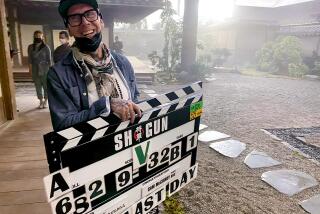‘Buddha’ Puts Gangs in New Setting
- Share via
Brian T. Maeda’s “Buddha Heads” is at once a powerful family saga, and a gangster movie that is way too talky but balanced by its unusual background. A tale about two generations of gangbangers in the Japanese American community is certainly not your typical fare.
“Buddha Heads” starts with a collage of newsreel images showing Little Tokyo’s Japanese Americans being evacuated to internment camps not long after the bombing of Pearl Harbor. The Sugimoto family is no different from countless others returning from Manzanar to rebuild their lives from scratch. The father takes odd jobs and works as a gardener. He and his wife are at last able to open their own grocery store on 2nd Street in Los Angeles’ Little Tokyo in 1968.
Just as things are looking up for the Sugimotos, a jittery drug addict holds up the grocery, killing 5-year-old Marco’s parents before his very eyes. His considerably older brother Suggzy, a member of a Japanese American gang, the Buddha Heads, is not present but catches up with his parents’ killer and shoots him dead. For premeditated murder, Suggzy receives a 25-year sentence. Meanwhile, Marco grows up in orphanages, developing a reputation for being out of control.
This is presented in highly condensed fashion, for the story really begins with Suggzy’s release from prison. Suggzy (Calvin Jung) is a stocky, rugged man of 45 who has served his long term with his resilience intact. He has had plenty of time to reflect on the folly of his revenge, because it robbed him of his primary responsibility in raising his younger brother.
Returning to a drastically changed Little Tokyo, Suggzy eventually tracks down Marco (Eddie Mui) only to find he is a member of the multiethnic Savage Boys. They steal cars for a Chinese American underworld kingpin, Wallace Chin (A.M. Lai), to whom Marco feels a deep paternal allegiance. Clearly, Suggzy has his work cut out for him in his determination to rescue his younger brother from his entrenched life of crime.
“Buddha Heads” plays out reasonably persuasively, much like similar movies set in Latino or African American communities. Mui and Jung are solid actors, as are Louise Mita as a bar owner attracted to Suggzy and Helen Ota as the daughter of one of Suggzy’s old pals. A gang counselor, she makes a deeper impression on Marco than on his older brother.
“Buddha Heads,” which is competently made, defies the stereotype of Japanese Americans as model citizens, as Maeda, a veteran cameraman, has pointed out in interviews. Yet how many fictional sagas, as opposed to documentaries, have been made about the Japanese American experience and its remarkable collective triumph over racism and injustice?
How about a drama about a family returning from an internment camp and successfully persevering over adversity to foster two generations of richly varied and accomplished citizens? Perhaps that would have been the more interesting story to tell.
*
Unrated. Times guidelines: some strong violence, blunt language; not for children.
‘Buddha Heads’
Eddie Mui...Marco Sugimoto
Calvin Hung...Suggzy Sugimoto
Helen Ota...Helen Yoshida
Louise Mita...June Endo
A Pathfinder Pictures release of a J-Town Pictures presentation. Writer-producer-director Brian T. Maeda. Cinematographer Dennis Matsuda. Editor Henry Te. Music Terry Plumeri. Costumes B. Vasques. Running time: 1 hour, 34 minutes.
Exclusively at the Monica 4-Plex, 1332 2nd. St., Santa Monica, (310) 394-9741.
More to Read
Only good movies
Get the Indie Focus newsletter, Mark Olsen's weekly guide to the world of cinema.
You may occasionally receive promotional content from the Los Angeles Times.










